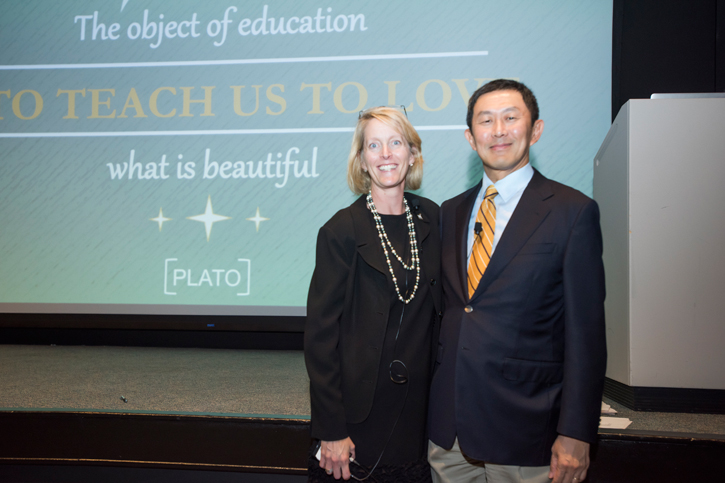
Senior Vice President Jennifer (J.J.) Wagner Davis and Provost and Executive Vice President S. David Wu hosted a Budget Town Hall meeting in the Johnson Center Cinema Tuesday, Sept. 12. Photo by Ron Aira.
The Town Hall Budget Meeting co-hosted by George Mason University Senior Vice President for Administration and Finance J. J. Davis and Provost S. David Wu began with questions, the answers to which will define how the institution moves forward in the next few years.
“What do we mean by differentiating the Mason education?” Wu said Tuesday to an audience of around 200 at the Johnson Center Cinema on the Fairfax Campus and those watching at George Mason’s other campuses via video conferencing. “Why should students with so many choices want to come to George Mason? How can we assure that students get the kind of learning experience they are entitled to?”
Over the next hour, Davis and Wu walked through the broad outlines of plans that include differentiating and improving the student experience; modernizing campus buildings, utilities and infrastructure; and maintaining the overall financial health of the institution.
Several additional benefits for faculty and staff were also announced, including 16 additional hours of flex holiday time for the 2018 calendar year: a full day off on Wednesday, Nov. 22, leading into the Thanksgiving break; and two days added to the winter break, which is from Dec. 22 through Jan. 3.
“It’s all about well-being,” Davis said. “Faculty and staff work in an amazing institution, doing amazing things every day. Sometimes in the busyness of what’s going on we lose sight of that. But we’re transforming lives every day and we work at this great institution together to accomplish all kinds of incredible initiatives.”
Redesigning and improving the student experience is a priority for Mason President Ángel Cabrera, Wu said, and will be done through a student-centric and technology-driven approach to improve student advising, success, graduation rates and career readiness.
That, he said, will go hand-in-hand with Mason Impact, which offers students experiential inquiry-based learning, research, internships and multidisciplinary explorations.
“They are two sides of the same coin,” Wu said. “One, Mason Impact, makes the students’ opportunities better and available, and the other helps students find them more easily through advising and various different types of activities.
“In a few years we would like every single one of our Mason graduates to be able to experience one of the tremendous opportunities in front of them.” Wu added that the goal is for students to “apply their knowledge to really make an impact in the world.”
The campus will also be going through a transition that begins in the summer with the demolition and eventual reconstruction of Robinson Hall, a $100 million state-funded project. Reconstruction of the utilities and IT infrastructure on the Fairfax Campus also are planned.
Davis admitted the process will be inconvenient but called it “the right thing to do.”
She said Mason’s priorities during the state’s budgeting process are undergraduate and graduate financial aid, and compensation for faculty and staff. The university will also ask to be compensated for past enrollment growth.
“Interesting fact,” Davis said. “George Mason has accounted for half of all the enrollment growth in the commonwealth the last decade.”
Mason’s enrollment is up to 36,000 after admitting 3,400 students in its largest, most diverse freshman class.
“It is also the smartest class if you look at their academic record,” Wu said. “So think about it, we’re bigger, better and more diverse. What’s better than that at Mason?”
